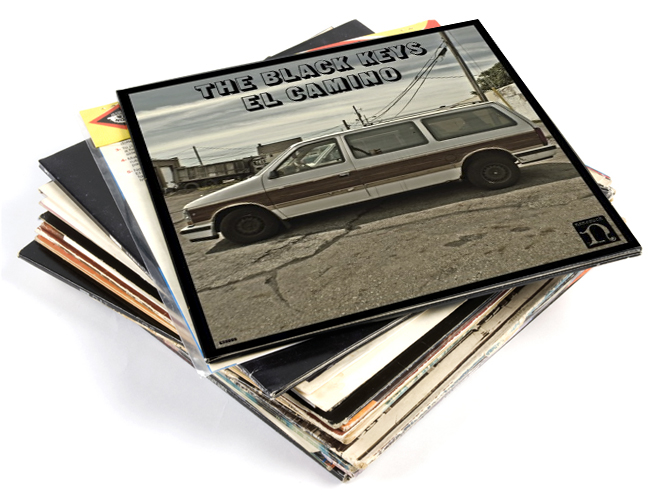
The Black Keys' El Camino: full album review track-by-track
Most bands screw up because their records sound like work. The music is efficiently made and extremely well-engineered but basically dull because it's all craft - well-intentioned craft and no soul. When an album offers little or no proof that something might happen - that wonderful, delicious creative air of danger, or a sense that things could fall apart at any moment - there's little reason to care.
The Black Keys, on the other hand, give you thousands of reasons to care, and they do so in ways that are magical, invisible, but oh so human. Sure, they craft their material, but not so you'd notice. They seem to rush into their music and inhabit it. Each song is a total happening, a rush of colliding emotions threatening to explode the framework, and that is very exciting, indeed.
Because they operate as a duo - Dan Auerbach on guitars/vocals and Patrick Carney on drums - The Black Keys have been forced to make their limitations work for them, and they succeed brilliantly on the just-released El Camino, in which they're teamed with longtime producer Danger Mouse.
Since 2008's Attack & Release, The Black Keys have been gradually stripping away at what began as a twisted, garage-y, blues-influenced sound and have transformed themselves, for now anyway, into a sleek rock machine, one that's built for speed. El Camino is a rarity in music: it delivers the instant gratification of fast food but none of the fat, no excess. Everything is lean, baby. The hooks come fast, the glammy-fuzz riffs are a-plenty, the choruses slam - you're in and you're out, and you're happy.
It could have been a disaster - a sly, calculated bid for arena-rock status (and the Keys will be playing those very venues in short order) - but Auerbach and Carney have such a damn good time making this glorious racket, and they find pockets of gold every which way but loose, that you're swept up in their frenzied distillation of musical idioms. El Camino, like the title suggests, is a rush. Too bad it doesn't come on eight-track tape with a pair of fuzzy dice.
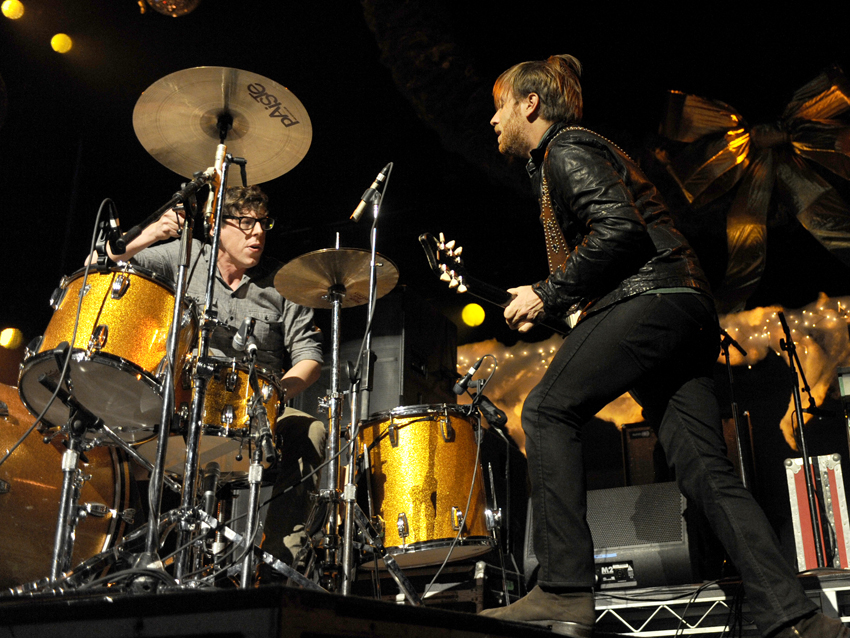
Lonely Boy
With Lonely Boy, El Camino peels out like Steve McQueen. A delirious, stoner-rock riff turns it up and and we're racing with surf-punk chords over a breakneck drum beat. The song wastes no time with niceties, demanding that you get the party started and commence grooving.
The chorus - like many on the record - is gang-sung, and one can quickly imagine how this will sound once the throngs lend their voices to their faves. Surprisingly, as the melody fills your head, you realize that Auerbach is singing, "I've got a love that keeps me waiting." The guitarist, fierce rocker if ever there was one, is a good old-fashioned gentleman at heart, and he's willing to bide his time till his lady is ready. You've gotta respect a dude like that.
The breakdown is a sweet blast of garage guitar grit offset by Danger Mouse's soulful keyboards - this is a mix that's prominent on the record - and it moves like a mofo.

Dead And Gone
A walloping drum and bass, reminiscent of The Pretenders' Mystery Achievement, kick off this righteous earthshaker in which Auerbach, sounding beat-up and broken, softly croons, "So long, why'd it take you so long?/ Every time I hear the whistle blow, I'm down below, you're gone."
The chorus, backed by handclaps, is vaguely Motownish, and it whips you right along merrily. Auerbach turns in a robust guitar solo, quickly overtaken by fuzz bass. The juxtaposition of so many genre-specific elements would result in a clusterfuck of confusion in lesser hands. But The Black Keys aren't just applying colors willy-nilly, they're letting you in on feelings. And because they're ruled by their emotions, there's a human connection one makes to their many splendored sonic hues.
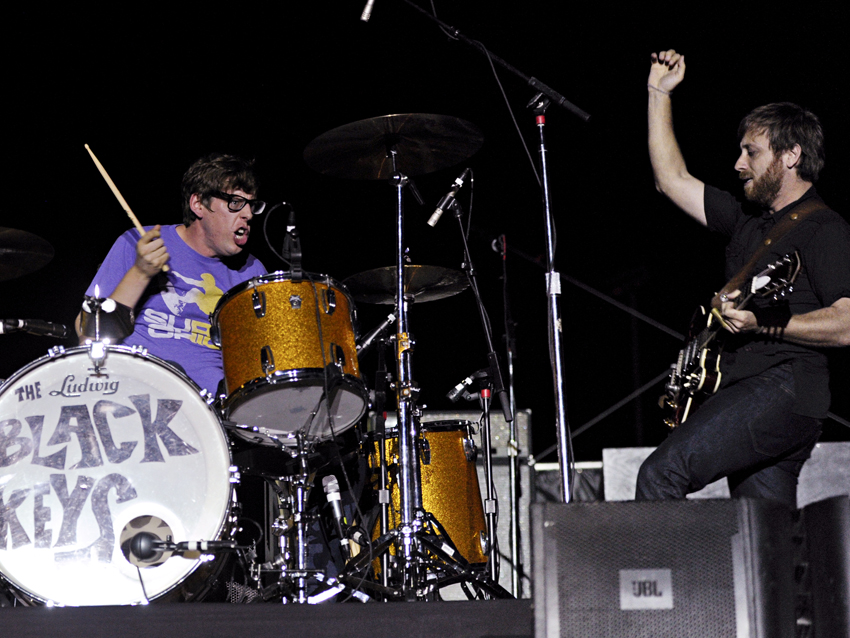
Gold On The Ceiling
A sturdy, growling, rippling riff - fat, rich with low end - very T. Rex, doubled by keys, sends this song right off. Auerbach's vocal is filtered, and he's belting it like he's at the top of his range, which creates more of a wounded, desperate effect.
The chorus is built around another astonishing, ironclad riff, punctuated by gospel harmonies and those wondrous handclaps that work their way into your mid-section.
A bracing, psychedelic solo sneaks out early after the first chorus, and it's repeated after the second. From there, we blaze out Spirit In The Sky-style, chugging along to a dirty ol' guitar and tambourine - the sound of which never gets old.

Little Black Submarines
With its gently plucked acoustic and Auerbach's fragile, forlorn vocal intoning, "A broken heart is blind," you might think that Little Black Submarines is an affecting folk hymn, especially when understated percussion and a swelling organ chime in.
As quick as you can say to yourself, "Wait, is this a different song?" everything changes, and a stunning arena-rock riff blows the roof off the dump, with Carney joining in with appropriate thunder.
Jimmy Page-esque licks dart in and out as the chorus, ratcheted to maximum overdrive, is reprised. It's all good, and then it gets better when a smoking blues-rock ride-out takes it on out.

Money Maker
How many instantly memorable, knock-your-dick-in-the-dirt riffs can The Black Keys come up with? Apparently, there is no answer, as Money Maker kicks a donkey's ass from the word go and doesn't let up.
Auerbach's voice is again filtered, and he sounds positively eerie on this mid-tempo rocker. The lyrics are virtually unintelligible - you can make out every third or fourth word in any line - but that's also something of the point. This isn't a song for deep reflection. Rather, this is kegger music, pure and simple.
A panoramic guitar solo (is that really a talk box we hear?) is a major highlight.
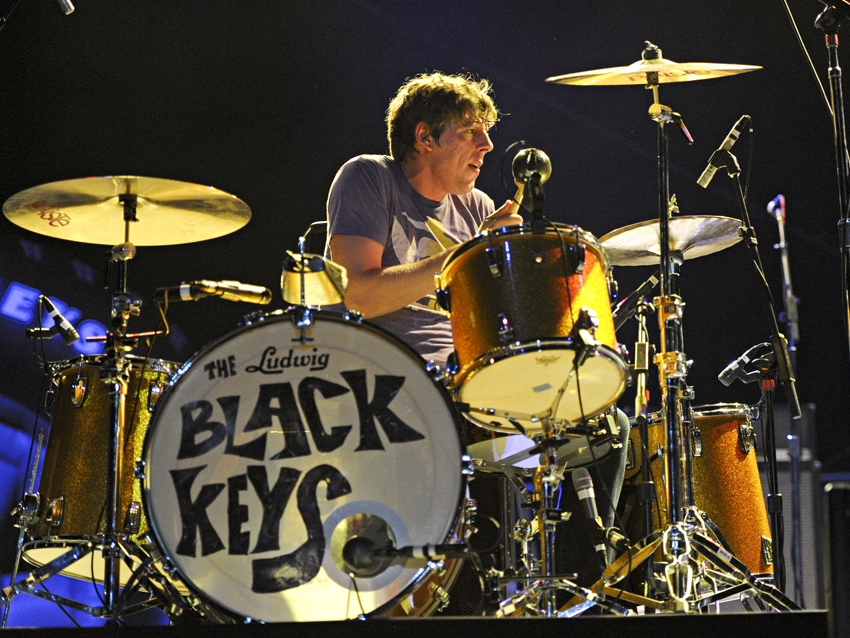
Run Right Back
A stinging, crying top-string progression, one which serves as a major hook, tucks into a freight train of grunge guitar and muscular drumming. Vocally, Auerbach is working a new space here, sexy and sassy, extolling the virtues of a real honey who just won't quit.
Mid-song, the guitar drops out, allowing drums and bass to do the heavy lifting. Gradually, the big noise - that grand, raucous din that is The Black Keys - drifts in and the tune comes to finish.
Or does it? No, wait...there's more! A staggering bit of raise-your-hands-in-the-air guitar heroics, backed by heavenly vocals, is the real closer.

Sister
Things get a little greasy on Sister, a funky, soul-informed groove-rocker built around Auerbach's jagged, reverb-drenched guitar chords and Carney's steady, swinging beat.
Overall, the vibe is a bit of a nod to Some Girls-era Stones - it snakes around you and pulls you along with it. This is specially true during the chorus, which is sung in a dreamy falsetto. You can almost picture Mick Jagger showing up on stage next year to have a go at this Sister.
Auerbach's guitar solo is a veritable amp blow-out, and it's backed by Danger Mouse's shimmering keyboards.

Hell Of A Season
Lots of bands have ripped off The Clash, and a few have even made careers of it, but the subtle, nuanced manner in which The Black Keys fire up this energetic reggae number, full of bouncy, reverbed guitar, shows that they know how to pay their respects properly (as The Clash once did with bands they borrowed from).
Carney's drumming is fluid yet balls-out - a remarkable demonstration of light and shade. But the big surprise here is Auerbach's singing, a fascinating performance filled with cockiness and heartbreak. His guitar solo is an affectionate nod to Mick Jones - sweet, soaring, bursting with feeling.

Stop Stop
The spirit of The Seeds, one of the first true garage rock bands, informs the sinewy, twisty guitar lines and gnashing snare attack on Stop Stop.
The chorus, accented by Danger Mouse's vibraphone, is almost childlike in its shout-out appeal. But as ear candy, it does the trick, and it leaves no saccharine aftertaste.
Auerbach pulls out another doozy of a solo, this one on slide. Fed through a Leslie, the sound buzzes like a mosquito, and the manner in which the guitarist alternates between moods and textures - there's a bit of George Harrison in his phrasing - is spellbinding.
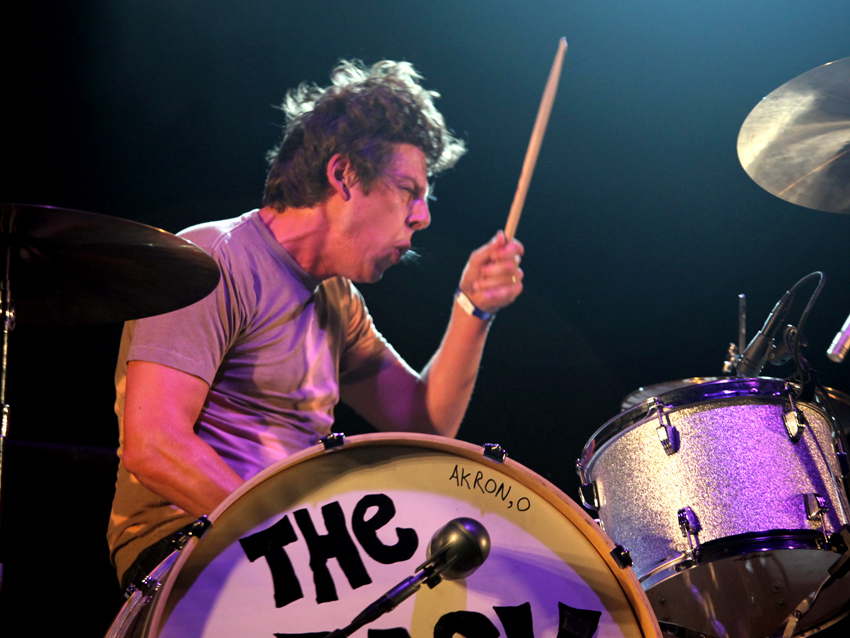
Nova Baby
The opening will conjure visions of desert vistas at dusk. It's vast, like the establishing shots in Sergio Leona spaghetti westerns. But as is often the case, the tune flips on its head, and before you know what's happening, we're into a four-on-the-floor, gang-sung sweet spot, the likes of which are impossible to resist.
Danger Mouse's keyboard soundscapes add a sweeping, cinematic quality. Taken together with Auerbach's drizzly solo, you've got yourself something of a mini-epic.

Mind Eraser
At first, you'll think you're hearing early Foreigner, but within seconds a sleek, new kind of rock-soul pattern emerges. On top of this, Auerbach, an incredibly unpretentious and modest singer, alternates between an evil drawl and a full-on blues howl.
As bass pumps high octane, the guitarist whips out a bravura stroke, a dazzling lead break that is extraordinary more for all the notes that are left out than the ones that are actually featured. Make no mistake, though, we are witnessing the emergence of a true guitar hero in the form on Dan Auerbach.
The tempo slows down as the song, and the album, cools. The Keys have burned up all they've got at this point; their fervor has been intelligently and imaginatively rendered. Clock this 38-minute slice of wonder as one of 2011's most entertaining, daring and important works - one with handclaps to spare.
Joe is a freelance journalist who has, over the past few decades, interviewed hundreds of guitarists for Guitar World, Guitar Player, MusicRadar and Classic Rock. He is also a former editor of Guitar World, contributing writer for Guitar Aficionado and VP of A&R for Island Records. He’s an enthusiastic guitarist, but he’s nowhere near the likes of the people he interviews. Surprisingly, his skills are more suited to the drums. If you need a drummer for your Beatles tribute band, look him up.
